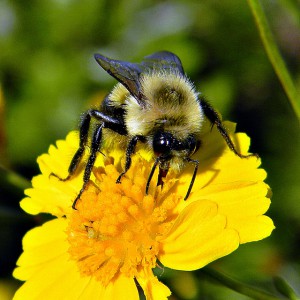Neonicotinoid pesticides and parasites together negatively affect bumble bees
As bee populations decline, scientists are directing their research to understand what factors are negatively affecting bee health and what can be done to help them. Because of the large role that the European domestic honey bee plays in crop pollination, particularly on expansive farms, the majority of research has been focused on managed colonies. However, native bees, which also contribute important pollination services to our crops and wild plants, are also experiencing declines. Now, a recent study published in Journal of Applied Ecology has found that neonicotinoid pesticides and parasitic infections are negatively affecting the bumble bee. Researchers exposed bees to different combinations of the neonicotinoid pesticides thiamethoxam and clothianidin and to a gut parasite to understand how they affected bumble bees individually and in combination. They found that exposure to the pesticides reduced the productivity of workers, was linked to earlier worker bee mortality, and decreased the overall productivity of the entire hive. Even more striking was researchers showed that parasitic infection combined with pesticide exposure significantly reduced the survival ability of the queen bee. These results confirm previous findings that demonstrate the detrimental effects of neonicotinoid exposure to bees, and further show that the effects may be magnified when pesticide exposure is combined with environmental stressors such as parasitic infections


